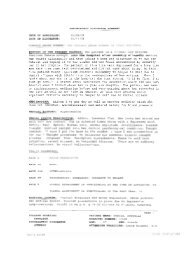C - Organized Mobbing
C - Organized Mobbing
C - Organized Mobbing
Create successful ePaper yourself
Turn your PDF publications into a flip-book with our unique Google optimized e-Paper software.
event by providing the majority of the audience. The political night prayers<br />
I discussed in the last chapter were, from the second one onward, strongly<br />
frequented by the Stasi's social forces attempting to corroborate the group's<br />
frustrations about not being able to conduct events as planned and to reach<br />
a wider audience in the GDR. Finally, the Stasi even broke into apartments,<br />
not just for searches, but to show that they could, with impunity, do as they<br />
pleased in this regard. All activists I spoke with found this measure particularly<br />
insidious because it confounded basic kinesthetic background understandings<br />
about the boundaries between inside and outside, control and<br />
contingency, safety and risk.<br />
The manipulation of corroboration requires a high degree of environmental<br />
control. What helped the Stasi enormously in this respect were the means<br />
available to it in a centrally organized state oriented toward a common goal<br />
by the membership of most significant actors in the same Leninist vanguard<br />
party. Even though the Stasi had no formal authority to issue directives directly<br />
to other branches of the administration or the economy, it produced<br />
a formidable track record of organizing workplace pressures on dissidents.<br />
These were often facilitated by employees who were co-opted as secret informants<br />
and on whom the Stasi could rely as their own influence agents.<br />
The Stasi's success is also owed to the willingness of employees in their role<br />
as party members to cooperate with their comrades from the fabled secret<br />
i police. After all, the Stasi could take for granted a basic agreement among<br />
comrades about the dangers of political diversion that were prominently<br />
discussed in general propaganda. A further reason for workplaces to comply<br />
with the Stasi's requests was that they did not want risky troublemakers<br />
among their ranks who could potentially endanger the productivity of their<br />
work collectives or attract unwanted party attention by creating a stir around<br />
some ideological issue. In either case this would have entailed blame ofleaders<br />
for lax discipline or unsuccessful ideological work.<br />
The control ofresources available to dissidents offered another set of means<br />
for the Stasi to try their hand at decomposing dissidents and groups. A necessary<br />
resource for action is time, and so the Stasi tried to deprive activists of<br />
the time to engage in oppositional activities. Prison terms mark the extreme<br />
end of such measures. Keeping dissidents employed was at times also choi<br />
sen as a means to keep them busy. The Stasi learned in the course of time<br />
that activists' underemployment in nondemanding jobs was detrimental to<br />
their intentions. It gave activists time to think and to prepare actions; and<br />
Perhaps even worse: it left the activists with dissidence as their main career.<br />
I





